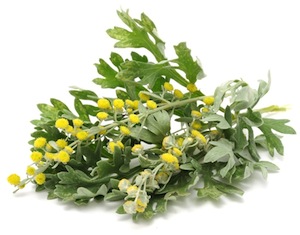- Wormwood is an herb. The above-ground plant parts and oil are used for medicine.
Contents
Uses
- Loss of appetite
- Upset stomach
- Gall bladder disease
- Intestinal spasms
- Fever
- Liver disease
- Worm infections
- To increase sexual desire
- As a tonic
- To stimulate sweating.
- Wormwood oil is also used for digestive disorders, to increase sexual desire, and to stimulate the imagination.
- Some people apply wormwood directly to the skin for healing wounds and insect bites. Wormwood oil is used as a counter-irritant to reduce pain.
- In manufacturing, wormwood oil is used as a fragrance component in soaps, cosmetics, and perfumes. It is also used as an insecticide.
- Wormwood is used in some alcoholic beverages. Vermouth, for example, is a wine beverage flavored with extracts of wormwood. Absinthe is another well-known alcoholic beverage made with wormwood. It is an emerald-green alcoholic drink that is prepared from wormwood oil, often along with other dried herbs such as anise and fennel. Absinthe was popularized by famous artists and writers such as Toulouse-Lautrec, Degas, Manet, van Gogh, Picasso, Hemingway, and Oscar Wilde. It is now banned in many countries, including the U.S. But it is still allowed in European Union countries as long as the thujone content is less than 35 mg/kg. Thujone is a potentially poisonous chemical found in wormwood. Distilling wormwood in alcohol increases the thujone concentration.
Cautions
- Wormwood is LIKELY SAFE when taken by mouth in the amounts commonly found in food and beverages including bitters and vermouth, as long as these products are thujone-free.
- Wormwood that contains thujone is POSSIBLY UNSAFE when it is taken by mouth. Thujone can cause seizures, muscle breakdown (rhabdomyolysis), kidney failure, restlessness, difficulty sleeping, nightmares, vomiting, stomach cramps, dizziness, tremors, urine retention, thirst, numbness of arms and legs, paralysis, and death.
- Pregnancy and breast-feeding: Wormwood is LIKELY UNSAFE when taken by mouth during pregnancy in amounts greater than what is commonly found in food. The concern is the possible thujone content. Thujone might affect the uterus and endanger the pregnancy. It’s also best to avoid topical wormwood, since not enough is known about the safety of applying wormwood directly to the skin.
- If you are breast-feeding, don’t use wormwood until more is known about safety.
- Allergy to ragweed and related plants: Wormwood may cause an allergic reaction in people who are sensitive to the Asteraceae/Compositae family. Members of this family include ragweed, chrysanthemums, marigolds, daisies, and many others. If you have allergies, be sure to check with your healthcare provider before taking wormwood.
- A rare inherited blood condition called porphyria: Thujone present in wormwood oil might increase the body’s production of chemicals called porphyrins. This could make porphyria worse.
- Kidney disorders: Taking wormwood oil might cause kidney failure. If you have kidney problems, talk with your healthcare provider before taking wormwood.
- Seizure disorders, including epilepsy: Wormwood contains thujone, which can cause seizures. There is concern that wormwood might make seizures more likely in people who are prone to them.
Interactions
Moderate Interaction Be cautious with this combination:
- Medications used to prevent seizures (Anticonvulsants) interacts with WORMWOOD: Medications used to prevent seizures affect chemicals in the brain. Wormwood may also affect chemicals in the brain. By affecting chemicals in the brain, wormwood may decrease the effectiveness of medications used to prevent seizures.
- Some medications used to prevent seizures include phenobarbital, primidone (Mysoline), valproic acid (Depakene), gabapentin (Neurontin), carbamazepine (Tegretol), phenytoin (Dilantin), and others.
Other Names
Absinth, Absinthe, Absinthe Suisse, Absinthii Herba, Absinthites, Absinthium, Ajenjo, Alvine, Armoise, Armoise Absinthe, Armoise Amère, Armoise Commune, Armoise Vulgaire, Artesian Absinthium, Artemisia absinthium, Common Wormwood, Grande Absinthe, Green Ginger, Herba Artemisae, Herbe aux Vers, Herbe d’Absinthe, Herbe Sainte, Indhana, Lapsent, Menu Alvine, Qing Hao, Vilayati Afsanteen, Wermut, Wermutkraut, Western Wormwood, Wurmkraut.
References
Source: WebMD, “Wormwood”, www.webmd.com/vitamins-supplements/

